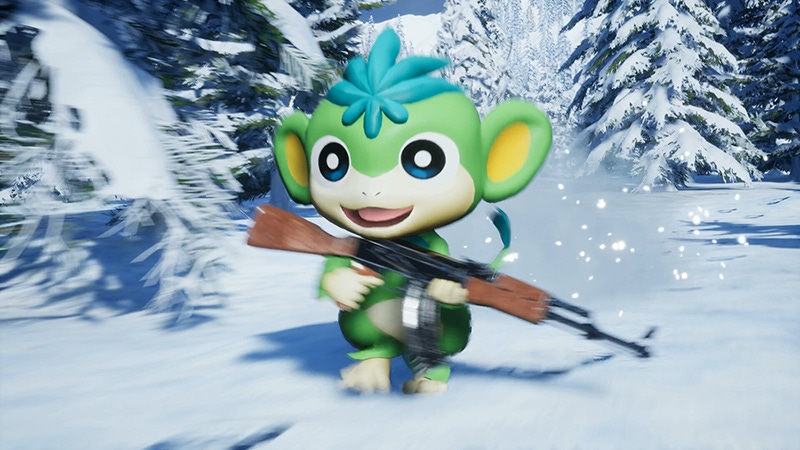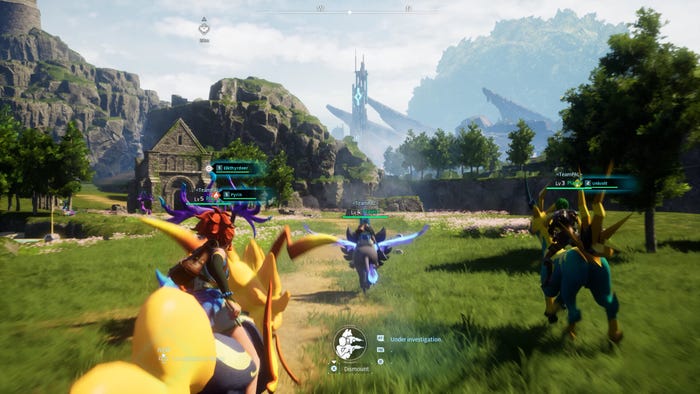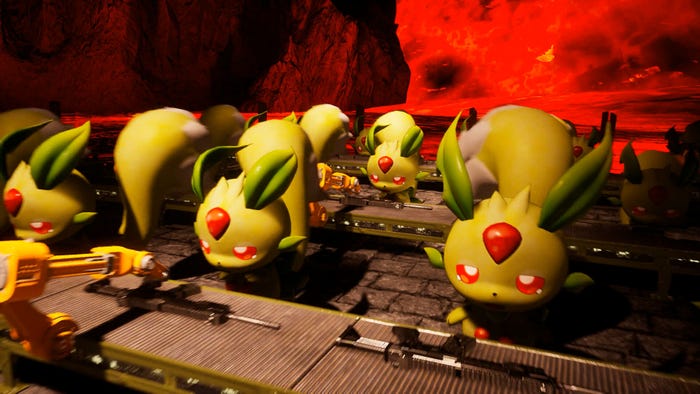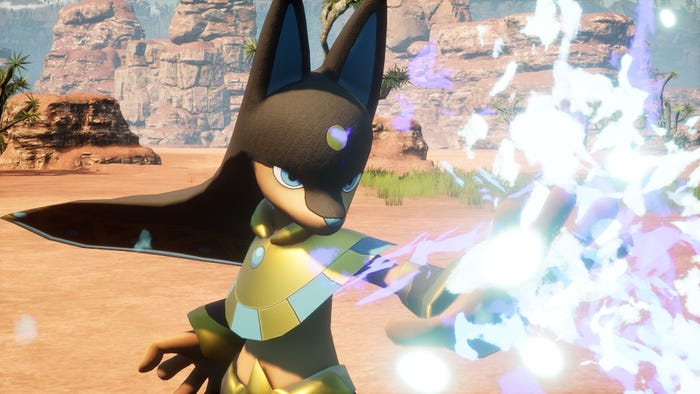
At a Glance
- Pocket Pair's Palworld has sparked intense discussion among game developers.
- Some developers are thrilled to see the game succeed. Others are leery of how much it looks like Pokémon.
Have you heard about Palworld? Yes you have. If you're reading this website about the world of game development you absolutely know what Palworld is. And that it sold millions of copies in its first week in Early Access. And that it's the second-most played premium game on Steam. On Steam. It's already hit Xbox but imagine what will happen when the game by developer Pocket Pair hits PlayStation.
Nobody in game development thought this game would be as titanic a hit as it has been. But its success has come with scrutiny and intense discussion. Players, developers, and media personalities have all jumped on social media with strong opinions about the game ranging from jubilant to condemning.
There's good reasons though! Palworld is a strange game. It's a base-building survival crafting experience descended from Rust, Conan Exiles, and Minecraft with the aesthetic of Nintendo and The Pokémon Company's hit game franchise Pokémon. The aesthetic is maybe the closest any developer has flirted with the popular brand's signature style, and it's surreal to see players laying into them with automatic rifles and forcing them to work in gun-making sweatshops.
But it's not quite right to say it's a "cynical" take on Pokémon either. The creature-capturing RPG elements of the series aren't anywhere to found, and the violence is still fundamentally cartoonish without any blood and guts. Conversation has also turned to questions of plagiarism and the use of generative AI after social media users dug up posts from Pocket Pal CEO Takuro Mizobe showing off AI-generated Pokémon. (No evidence has surfaced that any generative AI appears in the game).
It's a lot of topics bundled in altogether at once. We reached out to several game developers to assess how the rank-and-file of the industry are responding to the game—and what its success might mean for other studios.
It's a surprise Palworld works at all
Chatter about Palworld's success also orbited a blog post from Pocket Pair that, when read through Google Translate, indicates that the studio went through what could be describe as comedic levels of development struggles bringing the game to life. At one point the company ported the game from Unity to Unreal Engine 4 despite the fact that no one at the studio had experience in Unreal Engine 4!
It's not like crafting survival sims are easy to make either. Lost Skies lead game designer Luke Williams of Bossa Games told Game Developer it's a miracle that the game runs at all. He said that "it's rare for this type of game at the best of times. It's a huge open world on Unreal and performs incredibly well. You don't get those sorts of player numbers without that."
He pointed out that according to Pocket Pair's blog post, the team built Palworld off of the studio's first game Craftopia. He said it's a "relief" to still see so much enthusiasm for survival simulation games in the market, and that Palworld's development journey mirrors the one Lost Skies is on. He said that Lost Skies is built off one of Bossa's previous games, Worlds Adrift. "Having the same team take another go at a promising concept, refining and adding new ideas can produce some really special titles."
Bunnyhugg Games creative director Zach Soares said that reading through Pocket Pair's blog was like "a flashback." He pointed to the studio's explanation of its lack of best practices as something especially relatable. "No naming convention, unorganized files, not implementing a universal rig; these are all things I've gone through and many others have. You can make a great game and not know these things, these practices are meant to ease the development process and lessen headaches, not make the game itself good."
"I wish naming my files correctly meant I'd get a 10/10 on metacritic," he quipped. "But no, it'll help prevent bugs is all."

Image via Pocket Pair.
A senior developer at a triple-A studio who requested anonymity to speak candidly said Pocket Pair's success with Craftopia may be more an important than even the developer is giving credit for. "When looking at their last game Craftopia, it was enough of a success to give them the experience of actually making something available to players and to get a lot of feedback and experience.
"More importantly," he added. "[they got] time." Gameplay for Palworld was first shown off (with some mockery) all the way back in 2021, meaning it took another two years to hone the game for an Early Access launch. "That's a good amount of time that I'm not sure they would have been able to fund without the existence of their first game."
Is "Pokémon with guns" good or bad for the game?
"Pokémon with guns" is a textbook example of "X meets Y" style of game pitching and game marketing. The phrase evokes the idea of exploring a world of creatures ranging from cute to ominous all while sporting realistically-rendered guns firing not-so-realistic bullets.
Even though guns feature heavily in Palworld's trailer, they're still buried deep in the tech tree once you load up the game. But that absence doesn't seem to bother players. The game taps into a Pokémon fantasy that even Pokémon has underserved: the idea that you could play in a world where Pokémon powers have useful functions in society, not just combat.
Still, the cuteness-plus-guns vibes haven't sat well with some developers. "I know I’m gonna sound like 'old man yells at cloud' here, but the thing that upsets me the most about this game is how it’s going to appeal to kids," said Rose City Games co-founder Corey Warning. "To me, 'Pikachu with an AK47' with this kind of success and reach feels...depressing and dystopian."

Image via Pocket Pair.
Soares pointed out that "gritty Pokémon" isn't a fresh concept. "People joke that Digimon is Pokémon with guns, which it ostensibly is, but the difference is in the execution. Their execution of Pokémon with guns doesn't appeal to me. It's silly (which is fine) and exactly the kind of thing you'd get in video games, but it feels like an edgy joke taken too far."
Williams, whose previous work includes Surgeon Simulator and I Am Bread, said if he was making a game riffing on child-friendly characters like those made by Nintendo, he'd lean into the dark humor of it all too.
"If I were to develop a creature capture game I would totally lean into those darker aspects that the Nintendo games skirt around," he admitted. "I guess once you start you may as well go all in, so the game has you treating your Pals for depression and you can order your camp to overwork. It's not just the guns, they've thrown in a lot of dark stuff."
"It's a 'WHY, but also WHY NOT' situation for me," said the anonymous senior developer, who said his first reaction to the trailer was "WTF, it feels like a joke." He noted that because he hadn't grown up with Pokémon he doesn't have attachment to the franchise, adding that he's "far from the target audience" and that the transgressive promise of the game, along with its own merits made him care enough to try it.
"Then I was very, very pleasantly surprised by the quality of both the gameplay and production value," he said, nodding to the idea that Palworld's transgressive tone is more than just a cheap trick.
There's no proof of plagiarism in Palworld (and yet...)
Any claim that Palworld directly plagiarizes the Pokémon games has a heavy legal burden to stand up in court. There are huge similarities among some creature designs but time will only tell if The Pokémon Company will take any legal action against Pocket Pair. (It's said that it's looking into it, whatever that means).
Developer debate over Palworld's merits took some unexpected turns as social media users dug up Mizobe's old posts and heavily scrutinized the 3D models of various Pals. It's all a lot of smoke, but no fire (does that mean someone just... metaphorically burned their food on the stove here?)
"To me this all amounts to too many coincidences to feel comfortable about it," said Soares, pointing back to Mizobe's blog post about making Palworld where he said the company was chasing a "proven" style. "If they can this easily take from the biggest IP in the world, just because it's a "proven" look and they don't have the resources to come up with their own style, then they can just as easily take from indies without this level of coverage."

Image via Pocket Pair.
"I think the discourse comes from just the sheer numbers, and it [is] seemingly coming out of nowhere," Williams mused. He said there's been frustration among his peers for some time at the success of developers that "throw in asset store items into a soup of genres and outsell even the most heavily funded AAA title."
"A lot of people are dismissing the clear work that went into the game, there is a compelling game here, even if their methods are raising some questions."
"It's been annoying," the anonymous senior developer replied tersely. He said that if Palworld used generative AI to make its creatures it would be "wrong," but he doesn't see how that's possible given the timeline of development. But as for broader accusations of plagarism, he felt it should be nuanced given the game's "parodic nature" and the fact it's rated T for Teen by the ESRB and PEGI 12 in Europe.
Recall also that so many developers in video games build off the work of other studios (remember Fortnite and PUBG: Battlegrounds?). This anonymous developer questioned why anyone would suddenly want to make imitation "a capital sin."
Palworld landed at a strange time for the video game world
This article is actually going up later than I intended because while drafting it our whole team switched gears to cover the massive layoffs at studios like Riot Games and Microsoft Game Studios. Palworld is shooting up the charts while thousands of game developers lose their jobs.
It's a wild paradox. The game industry is being told not enough money is being spent to justify employment and meanwhile here's Palworld selling so many copies they urgently hopped on a call with Epic Games to get their servers online. Soares is among those who see a downside in the game's success.
"The expectation going forward will be to more closely stick to already proven concepts. There will be less exploration possible for indies because publishers now have an example of something skirting artistic theft and managing to make millions in hours," he said.
Williams—who sees the nonstop layoffs as a loss for the industry—at least takes solace that Palworld's success shows interest in the survival crafting genre is still strong. He said that it's "always nice to be reassured" that players are looking for new games in the genre.
Our anonymous senior developer said there's a massive silver lining developers are missing: that Pocket Pair is a shining example of fresh faces in game development in Japan, and that new studios are springing up to rival classic heavyweights like Capcom, Nintendo, Sega, and beyond. "Japan is reminding us that it's still in the game, and not only with old folks. This is the new generation and they have different creative drives."
For our part, it's always thrilling when a game becoming popular is what has got the attention of developers. There's a positive friction that can occur when a surprise hit of a game drives sharp opinions. Palworld is the right kind of contentious you hope for from a successful game—low stakes, conversation-driving, and a useful tool to help developers hone how they approach the game development process.
About the Author(s)
You May Also Like









